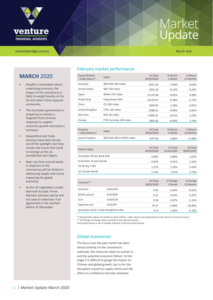The Pulse

- Despite a reasonably robust underlying economy, the impact of the coronavirus is likely to weigh heavily on the US and other China‐exposed economies.
- The Australian government is preparing to release a targeted fiscal stimulus response to support economic growth and avoid a recession.
- Geopolitical and trade tensions have been forced out of the spotlight, but they remain live issues that could re‐emerge as the US presidential race begins.
- Rate cuts from central banks in response to the coronavirus will be limited in addressing supply‐side issues impacting the global economy.
- As the UK negotiates a trade deal with Europe, Prime Minister Johnson said he will not seek an extension if an agreement is not reached before 31 December.
Global economies
The focus over the past month has been almost entirely on the coronavirus outbreak, the measures taken to contain it, and the potential economic fallout.
US
In response to the coronavirus outbreak and anticipated economic fallout, the US Federal Reserve made an emergency cut to the funds rate of 50 basis points – its biggest single cut since 2008 – bringing the rate to 1.25%.
Europe
Eurozone GDP grew by less than 0.1% in the December quarter according to the flash estimate, marking the slowest rate since the recession in 2012‐13.
China
At this stage it is difficult to gauge the exact impact of the coronavirus on Chinese and indeed global growth. Consensus forecasts for Chinese GDP growth in the current quarter are variable but could be close to zero given the extended closure of industry, restrictions on people movement, and the disruption caused to supply chains.
Asia region
Japan’s GDP contracted at a 6.3% annual rate in the December quarter after the October rise in the consumption tax, posting a result much weaker than the anticipated 3.7% fall
Australia
Unfortunately, the coronavirus and the policy response have come at a time when the Australian economy was showing signs of improvement and the budget was on a firm footing.